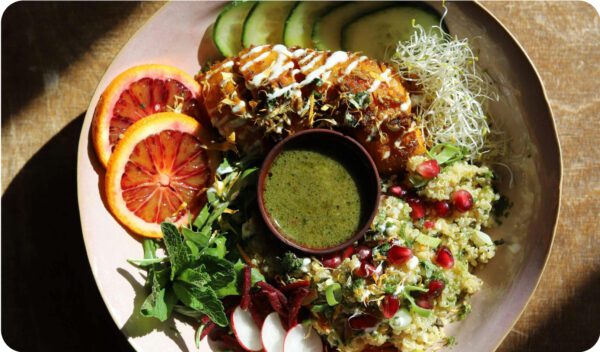Mindful Eating for Busy Lives: Ideas to Stay Healthy, Lose Weight, and Enjoy Food
Healthy eating often feels like a luxury for many working professionals and health enthusiasts managing packed schedules. However, the simplicity of mindful eating—being fully present while eating—can transform your eating habits without requiring hours of meal prep or restrictive diets. It’s a straightforward approach that anyone can adopt, fitting seamlessly into busy lives, helping to improve physical and mental health and aid in weight loss. Keep reading for key tips on mindful eating for busy lives.
What Is Mindful Eating?
Mindful eating is about more than just ‘watching what you eat.’ It’s the practice of focusing on your food, savoring every bite, and appreciating textures, flavors, and sensations. For instance, when you’re eating an apple, you’re not just biting into it; you’re noticing its crispness, sweetness, and sound when you take a bite. Developed from principles of mindfulness, it encourages an intentional relationship with food that goes beyond counting calories or following rigid meal plans.
Principles of Mindful Eating
- Awareness: Paying attention to your hunger and fullness cues.
- Non-judgment: Viewing food neutrally—no “good” or “bad” labels.
- Slow Eating: Chewing thoroughly to experience food’s flavors and textures.
- Gratitude: Appreciating the effort behind your meals—from sourcing to preparation.
Mindful eating’s emphasis on awareness and gratitude distinguishes it from traditional dieting, which often revolves around restrictive do’s and don’ts.
Benefits of Mindful Eating
Practicing mindfulness during mealtime can improve digestion, satisfaction, and control over eating habits. It can also reduce binge eating, curb cravings, and support long-term weight management. Mindful eating for busy lives promotes improved energy levels by encouraging intentional food choices and mindful meal practices.
How Busy Lives Disrupt Eating Habits
For professionals juggling deadlines, meetings, and social obligations, having time for a sit-down meal can feel impossible. Unfortunately, this fast-paced lifestyle often results in unhealthy habits such as:
- Mindless Snacking during work hours.
- Skipping Meals can lead to late-night overeating.
- Stress Eating as a coping mechanism.
- Reliance on Fast Food or convenience meals.
These patterns don’t just take a toll on your health—they impair energy levels, productivity, and focus, turning into a vicious cycle. Conscious eating for hectic schedules promotes better digestion and improved energy levels by encouraging intentional food choices and mindful meal practices.
The Stress-Unhealthy Eating Connection
Research shows that stress releases cortisol, a hormone that can increase hunger and lead to cravings for high-fat, heavily processed, sugary foods. Without moderation, this can contribute to weight gain and increase the risk of other health concerns.
Breaking the stress-eating loop requires small, deliberate steps prioritizing quality over quantity and mindfulness over multitasking.
Practical Tips for Incorporating Mindful Eating into a Busy Schedule
When you’re strapped for time, practicing mindful eating doesn’t mean you need to overhaul your routine completely. Here are some easy-to-implement tips to make it work for your lifestyle. The flexibility of intentional eating allows you to adapt it to your schedule, giving you the power to take control of your eating habits.
Plan Ahead:
- Spend 30 minutes a week planning meals. Prep ingredients or opt for batch cooking to ensure you always have healthy choices on hand.
- Use meal delivery services offering balanced, pre-portioned meals that align with your goals.
Create a Mindful Eating Environment:
- Dedicate 10-15 minutes per meal without distractions like phones, emails, or TV.
- Set a calming atmosphere—a clean workspace, soft light, or even relaxing music can enhance the experience.
Practice the Pause:
Before you begin eating, take a moment to breathe deeply, check your hunger levels, clear your head, and prime yourself to focus.
Make Time for Meals:
Schedule meals on your calendar like you would important meetings, reinforcing your commitment to giving meals their deserved priority.
Portable Mindful Eating
Busy professionals often dine on the go. Here’s how to practice mindfulness anywhere:
- Prepare snacks in advance that require portioning, like nuts or fresh fruit.
- Sip beverages (like your coffee or smoothie) slowly, savoring each sip.
- Eat intentionally, even if it’s just a small break to eat lunch at your desk.
Social Events
Maintaining mindfulness at networking events or dinners doesn’t have to feel awkward:
- Start with smaller portions, eat slowly, and engage in conversation to pace yourself.
- Observe before eating—what looks nourishing and will satisfy you best? Start with those first.
How Mindful Eating Supports Weight Loss
One of the most effective weight loss strategies doesn’t involve calorie counting or intense gym sessions. Studies have shown that mindful eating can result in significant weight loss and improved BMI:
- Tuning into Hunger Signals: Many people eat out of convenience or habit rather than actual hunger. Conscious eating trains you to differentiate between genuine hunger and emotional cravings, helping you reduce unnecessary caloric intake.
- Portion Control Without Measuring: By slowing down and savoring each bite, you can naturally recognize when you’re satisfied—often long before your plate is empty.
- Eliminating Emotional Triggers: Mindful eating helps you confront emotional eating patterns by encouraging you to pause and reflect rather than react impulsively to stress.
Mindful Eating for Mental Health
Mindful eating isn’t just about physical well-being—it can also profoundly impact mental health.
- Reduces Stress: Mindful eating promotes a sense of calm, turning meals into mini-meditative practices that counteract a stressful day.
- Improves Mood: Certain foods positively affect neurotransmitters, such as serotonin. By being mindful, you can explore how different meals make you feel energized or lethargic.
- Prevents Burnout: Taking time to enjoy meals breaks up work tasks, allowing for physical and mental recovery during your day.
Create a Sustainable, Mindful Eating Practice
Mindful eating for busy lives is less about following strict rules and more about creating sustainable habits that fit naturally into one’s life. Start small—focus on mindful snacking or a single meal each day before committing to more.
Stick with it, and you’ll notice the ripple effects in how you feel, think, and even approach your work and relationships. The best part? No special equipment, memberships, or massive time commitments are required—just you and your plate.
Want to Learn More?
At Deficit Daily, we’re here to support your health and wellness goals. Incorporating intentional eating into your hectic schedule can be a decisive first step toward a healthier, more balanced lifestyle.




